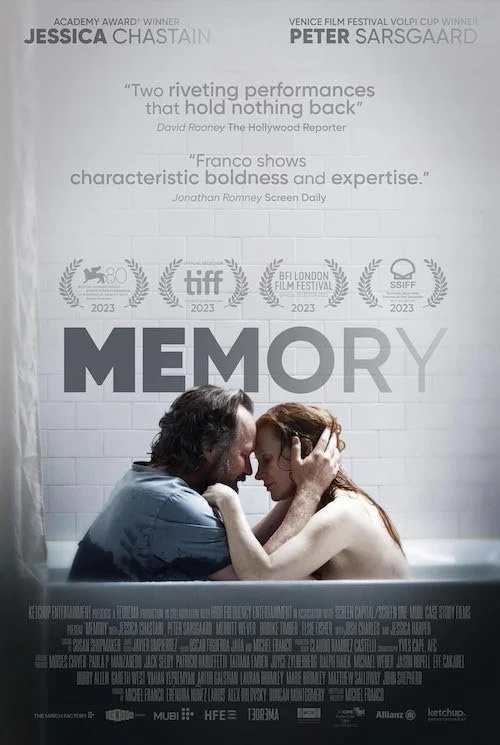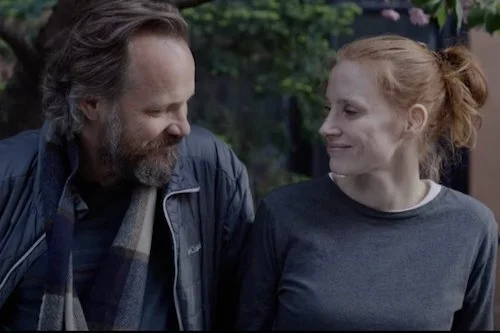Memory
Written by Andreas Babiolakis
Michel Franco’s latest film, Memory, asks us to work with missing information and disengaged shots, placing us in a state of disconnection due to the themes of memory loss. We start off with Sylvia (Jessica Chastain) who already has her own problems and history. A single mom and social worker, Sylvia knows what she needs to do in her life and how to best go about it. She vows to remain headstrong, particularly because she is a recovering alcoholic who needs to make sure she is on the right path. I suppose part of her healing is to face her past, and so she reluctantly goes to a high school reunion and regrets doing so. Once she leaves, she notices that she is being followed by one of the attendees who made her feel uncomfortable: a man named Saul (Peter Sarsgaard). He waits outside of her home overnight and is found the next day drenched in the rain; clearly, Sylvia is furious and wants him gone. Once Saul’s brother, Isaac (John Charles) fetches him, Sylvia learns that Saul is suffering from early onset dementia; his episode wasn’t malicious. Sylvia still feels unsafe, since she recalls that Saul was one of the group of boys that assaulted her in high school. Saul doesn’t recall this ever happening, and once he is exonerated of this claim, Sylvia uses this opportunity to try to learn more about Saul while figuring out her own mental illnesses.
The premise here is a good one because it forces us to grapple with trust and what we don’t know, all while providing a hazy mindset that encourages us to sympathize with Saul. At the same time, however, I feel like some of the moments that are meant to be the most meaningful are held back by static writing; the voyeuristic camera doesn’t help these situations since they begin to feel rudimentary as a result. I feel like the main pulse of this film that kept it chugging along comes from its acting, as the candidness of the subject matter stems from the heavy legwork that the performers undertake to elevate writing, fill up cold shots, and add breaths to the stillness of the film’s tone. Chastain puts herself on display via an achingly vulnerable performance full of trauma, forgiveness, and self-conflict. Sarsgaard matches her with a believable take on someone whose memories are disappearing more and more every day; not once does he feel like a caricature of a disease. Their supporting cast around them holds up nicely as well, but it’s clear that these two leads are the reason to watch Memory.
Memory benefits from the strong acting of its two leads, helping elevate the film above some of its pacing and tonal issues.
Even so, while I think Memory excels in some ways (the unbiased approach to the subject matters on screen, the natural results that come from the unobtrusive filming style), it still feels like a project that may have felt stronger on a stage or in a novella. On-screen, Memory feels like a half-story with the seedlings of ideas in a basement apartment full of newly purchased plants, far too many for one person to take care of properly; only some of these ideas blossom to fruition. By the time the film ends, I can’t help but wonder what the main purpose of the film is outside of the progressing romance between two people who are battling their own demons and families. Are we focusing on the fickleness of memory and how it can be distorted by gaslighting, lies and repressed trauma? Are we studying the slow-burning art of self-destruction and the catharsis within another person that can save us from ruin? We don’t really get a full answer as Memory decides to call it a day prematurely. I like so many of the ideas and starting points of this film, but the only elements that actually cross the finish line are the two strong performances at the forefront and the on-screen and narrative chemistry that helps them come even more alive. Memory feels like a draft of something stronger, not the end result that we have been given. Still, it’s an interesting enough draft that left me itching for more; sadly, we won’t be getting more.
Andreas Babiolakis has a Masters degree in Film and Photography Preservation and Collections Management from Toronto Metropolitan University, as well as a Bachelors degree in Cinema Studies from York University. His favourite times of year are the Criterion Collection flash sales and the annual Toronto International Film Festival.






